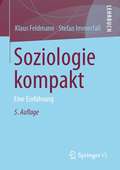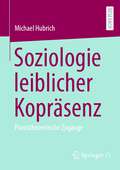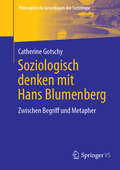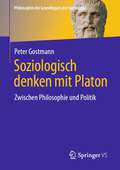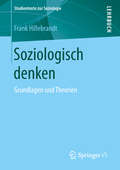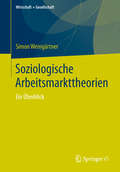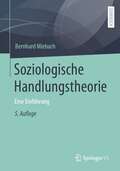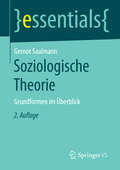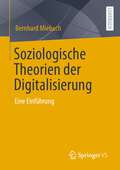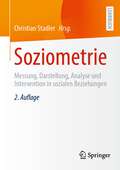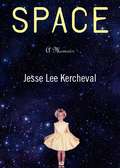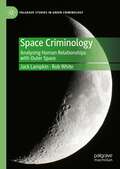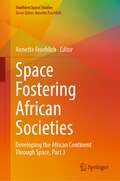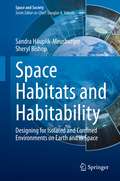- Table View
- List View
Soziologie kompakt: Eine Einführung (Wv Studium Ser. #188)
by Stefan Immerfall Klaus FeldmannDieses Buch wendet sich an Studienanfänger der Soziologie und Studierende mit dem Nebenfach Soziologie. Es bietet eine umfassende und leicht verständliche Einführung in die Grundlagentheorien und zentralen Bereiche der Soziologie. Die ausgewählten Daten, Beispiele und empirischen Untersuchungen beziehen sich primär auf den deutschen Sprachraum. Zusätzlich wurden Vergleiche mit anderen europäischen Staaten, den USA und auch außereuropäischen Ländern einbezogen. Dadurch kann über das Buch Anschluss an die internationale soziologische Diskussion erreicht werden.
Soziologie leiblicher Kopräsenz: Praxistheoretische Zugänge
by Michael HubrichDas Buch stellt die sozialtheoretische Frage nach der besonderen Qualität leiblicher Kopräsenz, verstanden als Urszene des Sozialen, und beantwortet sie mit den Mitteln einer leibphänomenologisch instruierten Praxistheorie. Ausgehend von einer Kritik am Cartesianismus klassischer Intersubjektivitäts-, Interaktions- und Kommunikationstheorien wird ein sich gegen tradierte epistemologische Dualismen richtendes und relational formuliertes Vokabular entwickelt, welches sich maßgeblich an den Begriffen der Praxis und des Leibes orientiert. Dadurch ist es möglich, die Sozialität in gemeinsamer Anwesenheit als ein sich in Wahrnehmung und Bewegung entfaltendes und dadurch affektives wie habituelles Praxisgeschehen zu erfassen. Im Zentrum des Buches stehen damit praxistheoretische Zugänge für eine Soziologie leiblicher Kopräsenz, mit denen (über-)situative Qualitäten der Mit-Anwesenheit soziologisch sicht- und analysierbar werden.
Soziologie und Krise: Gesellschaftliche Spannungen als Motor der Geschichte der Soziologie
by Stephan Moebius Andrea Ploder Nicole HolzhauserSeit mehr als 100 Jahren begleiten Soziolog*innen gesellschaftliche Entwicklungen mit ihren Überlegungen, beobachten und beschreiben gesellschaftliche Spannungen entlang unterschiedlicher Bruchlinien und Konjunkturen. Dieser Band geht der Frage nach, wie sich die Soziologie in unterschiedlichen Phasen ihrer Fachgeschichte mit wirtschaftlichen, politischen, sozialen und kulturellen Spannungen, mit Macht- und Ungleichheitsstrukturen und mit daraus resultierenden Krisen auseinandergesetzt hat. Eng damit verbunden ist die Frage, wie gesellschaftliche Rahmenbedingungen die Entwicklung der Soziologie beeinflusst haben, vielleicht sogar zu Motoren für das Fach geworden sind. Die Beiträge nähern sich auf unterschiedliche Weise dem historischen Zusammenhang zwischen gesellschaftlichen Spannungsverhältnissen und Soziologie in Zeiten von Krisen. Sie nehmen dabei Akteur*innen, Gruppierungen und Interaktionen, Sub-Kulturen und Milieus, organisationale, institutionelle und professionelle Strukturen und Prozesse der Soziologie in den Blick. Damit adressieren sie auch eine diagnostische Frage: Welche Soziologie ist in der Zukunft zu erwarten? Ist die Soziologie eine kritische Wissenschaft, die sich problematischen gesellschaftlichen Verhältnissen entgegenstellt? Inwiefern können wir mit einer Selbstbetrachtung und Kenntnis der Historizität der Soziologie dazu beitragen, gegenwärtige Beobachtungen, Erklärungen und Interpretationen unseres geschichtlich-gesellschaftlichen Seins zu reflektieren?
Soziologien in Neuseeland
by Charles CrothersDieses Buch bietet die erste umfassende Analyse der verschiedenen neuseeländischen Soziologien vom späten 19. Jahrhundert bis in die Gegenwart. Das Buch beginnt mit bisher nicht dokumentierten Einblicken in die Geschichte der Proto-Soziologie in Neuseeland und untersucht dann die parallelen Geschichten der Disziplin sowohl als Hauptfach in den Soziologieabteilungen als auch als diffusere "Soziologie" innerhalb anderer universitärer Einheiten. Dieses Buch bietet eine wertvolle Studie über die Entwicklung der Soziologie in einem halbperipheren Land.
Soziologisch denken mit Hans Blumenberg: Zwischen Begriff und Metapher (Philosophische Grundlagen der Soziologie)
by Catherine GotschyWenn die Soziologie sich als Wirklichkeitswissenschaft versteht, so setzt sie sich unweigerlich der grundlegenden Frage aus, was sie unter dem Begriff Wirklichkeit versteht und welche methodischen Zugänge sie zu ihr legt. Mit dem Philosophen Hans Blumenberg kann diesen Fragen mit besonderer Rücksicht darauf nachgegangen werden, welche Auswirkungen die je spezifischen Wirklichkeitsverständnisse der Wissenschaftler*innen auf ihre Forschungspraxis haben. Hierzu erschließt das Buch einerseits wichtige theoretische und methodologische Dimensionen der Metaphorologie Blumenbergs und rekonstruiert andererseits einige erkenntnistheoretische Prämissen und sozial-historischen Gründe. Darunter fällt insbesondere Blumenbergs Bestimmung des Verhältnisses von Logik und Ästhetik als gegenseitige Bedingung der Begriffsbildung, die auf Eindeutigkeit tendiert, und Metaphorik, die sich durch Mehrdeutigkeit auszeichnet. Hierzu lotet er die Funktionen dieser beiden zentralen Elemente einer intellektuellen Denkbewegung aus, über deren Nachvollzug erkennbar ist, inwiefern ein spezifischer Möglichkeitssinn systematisch in die Untersuchungen der soziologischen Wirklichkeitswissenschaft miteinbezogen werden kann. Zudem eröffnet sich ein Zugang zu einer kultursoziologisch interessierten Ideengeschichte der Soziologie selbst, die ihre Grundlagen auch auf die Interessen der Wissenschaftler*innen an ihren jeweiligen sozial-historischen Problemlagen befragt.
Soziologisch denken mit Jacques Derrida (Philosophische Grundlagen der Soziologie)
by Martin Eldracher Frank MeyhöferDas Buch geht systematisch der Frage nach, wie das Denken Jacques Derridas für die soziologische Theoriebildung und Gesellschaftskritik fruchtbar gemacht werden kann. Dabei versucht es ersichtlich zu machen, wie Identitäten und Normen auf ihr ausgeschlossenes Anderes hin geöffnet werden können. Es richtet sich an interessierte Leser*innen der Soziologie, indem einerseits Derridas philosophische Denkbewegungen zur Sprache gebracht und andererseits ein soziologischer Übersetzungsprozess vollführt wird. Auf welch vielfältige Weise lässt sich innerhalb der Soziologie und auch der politischen Theorie an die Dekonstruktion anschließen? Eine Hierarchiekritik und eine Offenlegung geschlechtlich markierter Machtverhältnisse werden dabei ebenso eine Rolle spielen, wie eine dekonstruktive Befragung sozialer Gründungsszenen und eine soziologische Perspektivierung von Erfindung, Gabe und Gastfreundschaft. Soziologisch denken mit Jacques Derrida umfasst nicht den Entwurf einer wasserdichten Theorie, sondern eine Sensibilisierung für die Instabilität und Spannungen der sozialen Welt.
Soziologisch denken mit Platon: Zwischen Philosophie und Politik (Philosophische Grundlagen der Soziologie)
by Peter GostmannWer nach den Grundlagen der Soziologie sucht, denkt üblicherweise nicht an Platon. Und wer sich grundlegend mit Platon beschäftigt, sucht üblicherweise nicht nach dessen Soziologie. Doch in beiden Fällen wird das Erkenntnispotenzial der Schriften des athenischen Akademielehrers nicht vollständig ausgeschöpft: Das Buch demonstriert, dass Platons Behandlung des Verhältnisses von Philosophie und Politik von einer soziologischen Konzeption getragen wird. Es entschlüsselt diese Konzeption vom Ausgangspunkt des sogenannten Siebten Briefs her, enthält einen systematischen Überblick des Ensembles sozialer Figuren, die Platon in seinen Dialogen auftreten lässt, und analysiert exemplarisch die soziale Dynamik im Hauptwerk Politeia. Auf diese Weise wird deutlich, dass die Lektüre Platons heutigen Soziologen helfen kann, die Grundlagen ihres Denkens besser zu verstehen, während umgekehrt soziologisches Denken allen Platon-Leser*innen ermöglicht, eine unbekannte Facette seiner Schriften zu entdecken.
Soziologisch denken mit Richard Rorty: Wider die repräsentationalistischen Prämissen der wissenssoziologischen Tradition (Philosophische Grundlagen der Soziologie)
by Fabian BeerObwohl die Kritik am repräsentationalistischen Bild vom Spiegel der Natur, sowie der darauf aufbauenden Disziplin der Erkenntnistheorie, ein wohlbekannter Topoi des 20. Jahrhunderts war, blieb die Soziologie eigentümlich unberührt von dieser Kritik. Womöglich erscheint sie nach der Lektüre bekannter Kritiken gar als paradigmatisches Beispiel, an dem sich eine spiegellose Auffassung von Wissen modeln könne. Folgt man jedoch dieser Fährte, so wird übersehen, dass auch die Verschiebung vom individuellen Bewusstsein hin zur sozialen Gruppe das zugrundeliegende Bild von Erkenntnis in zentralen Aspekten unberührt lassen kann. An dieser Stelle setzt das folgende Buch ein. Es denkt dabei insofern soziologisch mit Richard Rorty, als es dessen wohlbekannte Kritik am cartesisch-kantischen Bild von Erkenntnis auf die wissenssoziologische Tradition überträgt.
Soziologisch denken: Grundlagen Und Theorien (Studientexte zur Soziologie)
by Frank HillebrandtDas Buch führt präzise und gut lesbar in die Besonderheiten des soziologischen Denkens ein. Es beginnt mit den Merkmalen des Standpunktes, von dem aus die Soziologie beobachtet, und markiert damit die Unterschiede zwischen Alltagserfahrung und soziologischer Betrachtung. Im nächsten Schritt wird verdeutlicht, wie diese Beobachtungen in den Modus der Erforschung von Sozialität und Gesellschaft überführt und so theoretisch gefasst werden. Der Begriff "Theorie" wird damit ausgehend von seiner eigentlichen und sinnlichen Bedeutung "theōrein" - sehen - aus gedacht und entfaltet.
Soziologische Arbeitsmarkttheorien: Ein Überblick (Wirtschaft + Gesellschaft)
by Simon WeingärtnerDie Arbeit stellt die erste Einführung und Übersicht zu soziologischen Arbeitsmarkttheorien im deutschsprachigen Raum vor und versucht einen Brückenschlag zwischen Wirtschafts- und Arbeitsmarktsoziologie. Anhand eines mehrdimensionalen Systematisierungskonzeptes werden arbeitsmarkttheoretische Erklärungsansätze aus verschiedenen sozialtheoretischen Forschungsrichtungen vorgestellt und anhand ihrer zentralen Aussagen und empirischen Schlussfolgerungen miteinander verglichen.
Soziologische Denkweisen aus Frankreich
by Heike DelitzDer Band bietet einen Überblick über die Geschichte und den aktuellen Stand der französischen sozial- und gesellschaftstheoretischen Perspektiven und Forschungsprogramme der Soziologie - dabei auch über die Disziplingrenzen hinausblickend, um soziologische Theorien jenseits des Faches einzubeziehen: namentlich solche, die sich selbst eher in der Philosophie (des Politischen) oder Anthropologie verorten würden. Es geht hier darum, möglichst das ganze Spektrum des französischen Denkens sichtbar zu machen - auch in dessen Zusammenhang, in den theoriegeschichtlichen Abhängigkeiten und Oppositionen.
Soziologische Gegenwartsdiagnosen 3
by Sina Farzin Henning LauxIn diesem Buch werden einige der wirkmächtigsten soziologischen Gegenwartsdiagnosen des 21. Jahrhunderts in ihren zentralen Aussagen in einzelnen Beiträgen vorgestellt und diskutiert. Dazu gehören prägnante Einführungen in die Werke von Autorinnen und Autoren wie Donna Haraway, Didier Eribon, Hartmut Rosa, Andreas Reckwitz oder Arlie Hochschild. Aus der Lektüre der verschiedenen Deutungsangebote ergibt sich ein eindrucksvolles Mosaik soziologischer Perspektiven auf die Gegenwart, das für Lehrende und Lernende gleichermaßen von Interesse ist.
Soziologische Handlungstheorie: Eine Einführung
by Bernhard MiebachIn diesem Lehrbuch werden die wichtigsten soziologischen Theorien dargestellt, die das soziale Handeln erklären. Neben den soziologischen Klassikern Mead, Schütz, Goffman, Garfinkel, Parsons und Homans werden auch die neueren Ansätze von Habermas, Berger und Luckmann, Elias, Luhmann, Coleman, Esser, Giddens, Bourdieu, Collins, Latour, Foucault, White und Castells dargestellt. Damit gibt das Buch einen Überblick über Systemtheorie, Interaktionismus, Interpretative Soziologie, Sozialkonstruktivismus, Rational Choice Theorie, Strukturationstheorie, Feld- und Habitustheorie, Akteur-Netzwerk Theorie, Diskurstheorie und Netzwerktheorie. Diese Modelle werden anhand anschaulicher Anwendungsbeispiele aus der Alltagswelt, Organisationen und der Digitalisierung durch das Internet erläutert und grafisch zusammengefasst. Darüberhinaus wird die Methodik zur Anwendung der jeweiligen Theorien auf empirische Fragestellungen in Interaktionen, in Organisationen und digitalen Medien vermittelt.
Soziologische Theorie: Grundformen im Überblick (essentials #27)
by Gernot SaalmannWie erklärt sich menschliches Zusammenleben? Das Paper App gibt eine kurze Einführung in soziologisches Denken. Neben den herkömmlich kontrastierten Großrichtungen Holismus und Individualismus gibt es seit jeher eine weitere - den Relationismus. Nach einer knappen Einleitung in den Gegenstand, den Entstehungskontext und die Verfahrensweisen der Soziologie, wird gezeigt, inwiefern bereits drei Klassiker des Faches (Durkheim, Weber, Simmel) die drei logisch möglichen Grundperspektiven des Blicks auf das soziale Zusammenleben von Menschen entworfen haben. Die sich daraus ergebenden drei Grundrichtungen soziologischer Theorie (Objektivismus, Subjektivismus, Relationismus) werden an weiteren Beispielen der Theoriegeschichte erläutert. Abschließend werden diese drei Sichtweisen des Sozialen auf ihre praktische Anwendbarkeit überprüft.
Soziologische Theorien der Digitalisierung: Eine Einführung
by Bernhard MiebachDie soziologischen Theorien der Digitalisierung beschreiben und erklären die Formen der Nutzung und die Auswirkungen von Internet und Anwendungssystemen auf Individuen, Organisationen und Funktionssysteme der Gesellschaft. Aufbauend auf den empirischen Analysen insbesondere von sozialen Medien, Big Data und von Suchalgorithmen werden Techniksoziologie, Systemtheorie, Netzwerktheorie, Rational-Choice Theorie, Akteur-Netzwerk Theorie, Interaktionstheorie sowie Theorien sozialer Ungleichheit, sozialer Bewegungen und medialer Öffentlichkeit auf den Gegenstandsbereich der Digitalisierung angewendet. Das Einführungsbuch stellt die wichtigsten soziologischen Theorien zur Digitalisierung und die gegenstandsbezogenen Analysen zu Metrisierung, kulturellen Singularitäten, Macht von Algorithmen und Entnetzung anschaulich dar und zeigt anhand von Beispielen, wie sich diese theoretischen Modelle zur Analyse der digitalen Praktiken verwenden lassen. Es werden die Funktionsweise und die Auswirkungen der digitalen Medien wie Google, Facebook oder Twitter und der digitalen Transformation durch Künstliche Intelligenz (KI) dargestellt.
Soziologische Ästhetik: Herausgegeben und eingeleitet von Klaus Lichtblau (Klassiker der Sozialwissenschaften)
by Georg SimmelGeorg Simmel gilt zu Recht als ein klassischer Theoretiker der Moderne. Er sah im Überschneidungsbereich von ästhetischer Erfahrung und einer genuin soziologischen Beschreibung von Modernität die Möglichkeit gegeben, der epochalen Eigenart des modernen Lebens mit all seinen Spannungen, Konflikten und Paradoxien auf die Spur zu kommen, ohne diese vorschnell unter eine begriffliche Systematik zu subsumieren. In diesem Band wird Simmels Programm einer „soziologischen Ästhetik“ unter anderem anhand einiger seiner kunstkritischen Schriften aus den 1890er Jahren, seiner Arbeiten über die Rolle der modernen Kunst- und Gewerbeausstellungen, der Mode und dem Schmuck sowie seiner luziden Studien über die Geselligkeit und die Koketterie dokumentiert.
Soziometrie: Messung, Darstellung, Analyse und Intervention in sozialen Beziehungen
by Christian StadlerSoziometrie ist eine sowohl qualitative wie quantitative Herangehensweise, um Beziehungen in Gruppen zu untersuchen. Sie untersucht das Wahlverhalten von Menschen anhand bestimmter Kriterien und dient gleichzeitig als Intervention für eine Verbesserung von Gruppenzusammenhalt und -leistung. Dieses Buch bietet eine kompakte Einführung in die Grundlagen der Soziometrie. Es werden unter anderem das sozionomischen System, verwandte Untersuchungsmethoden und Weiterentwicklungen (z.B. der populären Netzwerkananalyse) sowie zahlreiche Instrumente und psychodramatische Messverfahren dargestellt. Darüber hinaus werden in einem Praxisteil zahlreiche Fallbeispiele aus unterschiedlichen Anwendungsfeldern erörtert.
Soziopsychosomatische Gesundheit, robuste Demokratie, Suffizienzökonomie und das „glückliche“ Leben: Über ein wechselseitiges Verhältnis (Gesundheit und Gesellschaft)
by Peter-Ernst SchnabelNicht einmal zehn Prozent der knapp zweihundertdreißig Milliarden Euro, die sich die Deutschen ihre Krankenversorgung jährlich kosten lassen, fließen gegenwärtig in die Präventionspolitik und davon wiederum nicht mehr als zwanzig Prozent in die Förderung der Gesundheit. Die vorliegende Untersuchung setzt sich in kritisch-konstruktiver Manier mit den interventionsphilosophischen, systemischen und professionspolitischen Hindernissen auseinander, die der längst fälligen Beseitigung dieses Unterversorgungsdilemmas im Wege stehen. Sie bemüht sich, mit dem Irrglauben aufzuräumen, dass eine Gesundheitsförderungspolitik, die mehr sein will, als die bloße Verhinderung von Krankheit und Gebrechen, realisiert werden könne, ohne die bestehenden politischen, wirtschaftlichen und gesellschaftlichen Bedingungen grundlegend zu verändern. Und sie macht Vorschläge, in welche Richtung diese Veränderung gehen könnte.
Soziotechnische Optimierungs- und Anpassungsfaktoren im Arbeitssystem Smart Maintenance: Zur besonderen Bedeutung der interdependenten Ressource des Erfahrungswissens (Dortmunder Beiträge zur Sozialforschung)
by Martin EisenmannDieses Buch beschäftigt sich aus einer sozialwissenschaftlichen Perspektive mit den soziotechnischen Anpassungs- und Optimierungsfaktoren, die im Zuge von Digitalisierungsprozessen in innerbetrieblichen Instandhaltungsabteilungen und bei industriellen Serviceanbietern zu erkennen sind. Methodisch greift die Analyse auf die Erstellung von Betriebsfallstudien in den fokussierten Industriesektoren zurück, um anhand dessen die zuvor konzeptionell-theoretisch erarbeiteten Annahmen empirisch zu überprüfen. Im Rahmen dieser Veränderungen kristallisiert sich als ein zentrales Ergebnis der Untersuchung heraus, dass das Erfahrungswissen der Beschäftigten als eine besondere Ressource zu identifizieren ist.
Sozioökonomie und Wirtschaftssoziologie im Spiegel sozialwissenschaftlicher Bildung
by Birgit Weber Tim Engartner Andrea SzukalaDieser Sammelband identifiziert die Schnittstellen der politischen, gesellschaftlichen und wirtschaftlichen Domäne aus wirtschaftssoziologischer und fachdidaktischer Perspektive wie auch vor dem Hintergrund nationaler wie internationaler Forschungsansätze der sozialwissenschaftlichen Bildung. Dabei werden die Innovationspotenziale einer sozioökonomischen Perspektive an den Übergängen von Fachwissenschaft und Fachdidaktik(wissenschaft) ausgearbeitet. U. a. werden diese in Beiträgen zu Theorieentwicklungen des Neopragmatismus sowie der an sie anschließenden Curriculum- und Partizipationsforschung diskutiert, welche jeweils Weiterentwicklungen des Feldes – insbesondere im Lichte der Neuformulierung eines sozio-ökonomischen Curriculums – in den Blick nimmt. Die auf Pluralität, Interdisziplinarität, Multiparadigmatizität und (kritische) Reflexion angelegte Festschrift für Reinhold Hedtke schlägt die Brücke zwischen den zentralen sozialwissenschaftlichen Bezugsdisziplinen Wirtschaftswissenschaften, Soziologie, Politikwissenschaft und Geographie sowie Geschichtswissenschaft, Philosophie und Erziehungswissenschaft.
Space
by Jesse Lee KerchevalJesse Lee Kercheval opens her story in Cocoa, Florida, in 1966 as a precocious ten-year-old whose family-father, mother, two little girls-is trying to ride the Space Race's tide of optimism. But even as the rockets keep going up, the Kercheval family slowly spirals down.
Space Criminology: Analysing Human Relationships with Outer Space (Palgrave Studies in Green Criminology)
by Rob White Jack LampkinAs humans expand the frequency and scale of interactions off-planet, Space Criminology ponders the nature of crime, harm and transgression in outer space and possible responses to these. The first book of its kind, it discusses the dynamics of space crime, from those involving powerful elites through to those associated with the mundane interactions of people living and working in space. It is essential reading for anyone interested in extra-terrestrial crime, space law, and criminal justice.
Space Fostering African Societies: Developing the African Continent Through Space, Part 3 (Southern Space Studies)
by Annette FroehlichThis peer-reviewed book provides detailed insights into how space and its applications are, and can be used to support the development of the full range and diversity of African societies, as encapsulated in the African Union’s Agenda 2063. Following on from Part 1 and 2, which were highly acclaimed by the space community, it focuses on the role of space in supporting the UN Sustainable Development Goals in Africa, but covers an even more extensive array of relevant and timely topics addressing all facets of African development. It demonstrates that, while there have been significant achievements in recent years in terms of economic and social development, which have lifted many of Africa’s people out of poverty, there is still a great deal that needs to be done to fulfill the basic needs of Africa's citizens and afford them the dignity they deserve. To this end, space is already being employed in diverse fields of human endeavor to serve Africa’s goals for its future, but there is much room for further incorporation of space systems and data. Providing a comprehensive overview of the role space is playing in helping Africa achieve its developmental aspirations, the book will appeal to both students and professionals in fields such as space studies, international relations, governance, and social and rural development.
Space Habitats and Habitability: Designing for Isolated and Confined Environments on Earth and in Space (Space and Society)
by Sandra Häuplik-Meusburger Sheryl BishopThis book explores creative solutions to the unique challenges inherent in crafting livable spaces in extra-terrestrial environments. The goal is to foster a constructive dialogue between the researchers and planners of future (space) habitats. The authors explore the diverse concepts of the term Habitability from the perspectives of the inhabitants as well as the planners and social sciences.The book provides an overview of the evolution and advancements of designed living spaces for manned space craft, as well as analogue research and simulation facilities in extreme environments on Earth. It highlights how various current and future concepts of Habitability have been translated into design and which ones are still missing. The main emphasis of this book is to identify the important factors that will provide for well-being in our future space environments and promote creative solutions to achieving living spaces where humans can thrive. Selected aspects are discussed from a socio-spatial professional background and possible applications are illustrated.Human factors and habitability design are important topics for all working and living spaces. For space exploration, they are vital. While human factors and certain habitability issues have been integrated into the design process of manned spacecraft, there is a crucial need to move from mere survivability to factors that support thriving. As of today, the risk of an incompatible vehicle or habitat design has already been identified by NASA as recognized key risk to human health and performance in space. Habitability and human factors will become even more important determinants for the design of future long-term and commercial space facilities as larger and more diverse groups occupy off-earth habitats. The book will not only benefit individuals and organizations responsible for manned space missions and mission simulators, but also provides relevant information to designers of terrestrial austere environments (e.g., remote operational and research facilities, hospitals, prisons, manufacturing). In addition it presents general insights on the socio-spatial relationship which is of interest to researchers of social sciences, engineers and architects.
Space Invaders: Race, Gender and Bodies Out of Place
by Nirmal PuwarIncreasingly, women and minorities are entering fields where white male power is firmly entrenched. The spaces they come to occupy are not empty or neutral, but are imbued with history and meaning. <p><p>This groundbreaking book interrogates the pernicious, subtle but nonetheless widely held view that certain bodies are naturally entitled to certain spaces, while others are not. Drawing on case studies from within the nation state, including Westminster and Whitehall, the art world, academia and everyday life, this book uncovers the hidden processes that undermine female and/or racialized bodies in spaces marked by masculinity and whiteness. How are positions of authority racialized and gendered? How do people manage their femininity and/or blackness while in a predominantly white male context? How do spaces become naturalized or normalized, and what does it mean when they are disrupted? <p><p>Answering these questions and many more, this book is the first to examine the meaning of diversity in organizations in its absolute complexity. It argues that a thorough engagement with difference requires a rigorous investigation of how institutional cultures become normative. It is only when we see and name this invisible central point of reference, which is so often taken for granted, that we can we truly unsettle long established links. Uniting social, cultural and political theory, and engaging with a range of substantive material from a variety of institutions, this book is a timely contribution to wide-reaching debates on race, gender and space.
